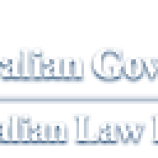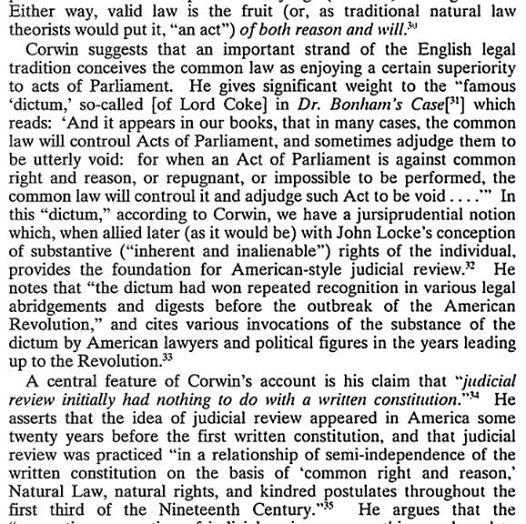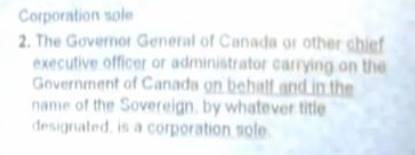Australian men and women really need to start paying attention.
What the Attorney-General [Senator the Hon George Brandis QC] is almost attempting to do is to convince us that we are a "sovereign" state and that as such, we decide our own destiny, meaning law, etc
This is almost along the lines of other U.N. (corporate) thinking, too.
Here: *** https://www.facebook.com/groups/211871612287035/permalink/529671433840383/
Ross BradleyHow to get out of paying fines, rego, fees and tolls
The LAW?? (**cough**)
New Australian law reform inquiry to focus on freedoms - 11 Dec. 2013
"I have asked the Commission to identify where traditional rights, freedoms and privileges are unnecessarily compromised within the legal structure of the Commonwealth. .... Where encroachments exist, the Commission will determine whether they are justified.
"For too long we have seen freedoms of the individual diminish and become devalued. The Coalition Government will strive to protect and restore them."
"Freedoms are some of the most fundamental of all human rights. They underpin the principles of democracy and we cannot take them for granted.
"The Commission will focus in particular upon commercial and corporate regulation; ........ environmental regulation; and workplace relations."
The Attorney-General [Senator the Hon George Brandis QC] has asked the Commission to provide its report by 1 December 2014.
The proposed terms of reference are attached.
******************
Traditional rights, freedoms and privileges
1.1 The Australian Law Reform Commission has been asked to identify and critically examine Commonwealth laws that encroach upon 'traditional' or 'common law' rights, freedoms and privileges
http://www.alrc.gov.au/…/traditional-rights-freedoms-and-pr…
Freedoms Inquiry Wiki - Catalogue of Australian Commonwealth laws that limit or encroach upon traditional rights, freedoms/privileges - Published on 15 September 2014.
The ALRC has been asked to consider corporate and commercial law, environmental law and workplace relations law, but the Inquiry is not limited to these areas.
We need two things:
1- In the first column of the relevant table, identify the law that limits or encroaches on the particular right, freedom or privilege-the name of the statute and, if possible, the section number;
2- The second column of the table, briefly explains how the law encroaches on the right, freedom or privilege.
What are Traditional Rights - http://tinyurl.com/nb8kqm8
Traditional rights, freedoms and privileges | ALRC
1.1 The Australian Law Reform Commission has been asked to identify and critically examine Commonwealth laws that encroach upon 'traditional' or 'common law' rights,...
alrc.gov.au
-

Ross Bradley ..
George Brandis (and the ALRC) need to soon realise that we, as a U.N. corporate state are NOT "sovereign" and that if the very "originals" (in both Australia and the America's/Canada) must answer to papal law (the bulls), then that law equally applies, to us all.< "The Papal Bulls that sanctioned the invasion and exploitation of Indigenous peoples lands all around the world are still valid." >
< "However, the legacy of Terra Nullius remains with the Crown retaining the underlying sovereignty of all land in Australia." >
Fact! http://bit.ly/1wB9Zx7
In the U.N. and in relation to the "Doctrine of Discovery", well, the more things change the more they stay the same? (It simply ain't 'gunna' happen.)
[The U.N. corporation answers to who?]
< The eleventh session of the Permanent Forum described the Doctrine of Discovery as a "nefarious doctrine" that "became the basis for the assertion of authority and control [by states] over the lives of Indigenous Peoples and their lands, territories and resources." >
At its 13th session, the Forum recommended that the full "Study on the impacts of the Doctrine of Discovery on indigenous peoples.."
< In fact, the high-level meeting did nothing. [The high-level plenary meeting / World Conference on Indigenous Peoples.]
It neither discussed nor repudiated the Doctrine of Discovery. It left the doctrine in place, without critique, as an ongoing basis for states to claim Native lands.>
< "Popular desires" exist for Indigenous Peoples to have standing in the United Nations. A rational examination of the evidence shows this has not happened.
The evidence from the high-level outcome document shows the UN does not even pay attention to its own Permanent Forum on Indigenous Issues. >
http://indiancountrytodaymedianetwork.com/.../un-ignoring...
Aboriginal Legal Service of Western Australia. One of the largest community based Aboriginal and Torres Strait...
als.org.au
Like · Reply · Remove Preview · 4 hrs · Edited
-

Ross Bradley .
Clearly the corporation that is Australia (the Government of Australia) answers to the crown (the Holy SEE/Pope Francis) and it does so through the Governor General, [Sir] Peter Cosgrove. (As a corporation sole.) -

Ross Bradley .
Rule of Law ... Natural law. ...Common law< Speaking at a UN conference on international law, the Vatican's Secretary for Relations with States [Archbishop Dominique Mamberti] said that the rule of law must ultimately be based on a common understanding of natural law. >
How could the 'enforcement' of any state corporation's Statute, Act, Legislation or, Road Rule ever be considered as being valid, in terms of a living man and women (being the "policy enforcer") having any such 'validity of enforcement' at law, over another's man or, women's protection through, Natural law?
(Natural law - Common law - Do no Harm.)
Page 10/17 - http://tinyurl.com/n4btr5y
Always, only an opinion.
LC
ps; *** (Should the link to the Facebook Group early in the post, not open.)
"Sovereign" - "Sovereignty" (Re-visited.)
Often misused words, this pic below from Canada's 'corporate rule book' begs that we should have a further look into both these very words.
In a search of content in the group, there are many mentions in discussions of that word "sovereign" and or, "sovereignty". - http://tinyurl.com/ovoe4mf
The "Crown"
We make the claim in this group that the Pope (Francis) is the only Living 'sovereign' (and of a sovereign state - the Vatican City State), and of all 193 corporate states of, the UNITED NATIONS' corporation.
This leads us to the realisation that under the initial Supreme (and what is the only Lawful) Global Estate Trust, all the land within those 193 corporate states is "crown" land and is controlled under that same Trust. We are the living Beneficiaries of that Land.
Are Homes 'over-priced'? You bet they are. Are Rates on land an unlawful impost? Yes indeed they are.
Are corporate state governments that either sell crown land or, permit the sale of farm land to foreign corporations acting deceitfully? You bet they are. Are they not, only selling a "right" to manage and or, farm that land? (China is known to be buying lots of farm-land. A 'right' to grow food.)
Was the consortium that paid out $7 billion for 'Queensland Motorways' to QIC Ltd not 'sold a pup'? I thing they were.
I guess the list could get much longer. The "land" itself is never "owned", as you can't own land. It belongs to the people. (It's part of the Global Estate Trust.)
"Sovereignty"
Whilst there is only the ONE living sovereign lawmaker it just may be the case, that all the corporate entities or, states within the UNITED NATIONS corporation (including even, down to our 'local' councils) are considered as legally being individually, independent 'sovereign' states - and do have a certain power for them to do everything in a state, without accountability. (As long as it is lawful.)
Both the pic below and the following words point to this as being a possibility.
This would mean that ethically & lawfully (deceit?), corporate governments and corporate local councils can "buy" land yet they can't sell it.
Why? (Read above. Is it an ethical sale? Full disclosure?)
Councils (it's pretty clear when you read this) are all considered as being, "other political subdivisions".
When a former Comptroller General of the United States (yes, of Congress, and as the 'bean counter' for the very UNITED STATES corporation itself and under the UNITED NATIONS' corporation - and that includes all of the 193 corporate states that are all ultimately, under the law of the Pope), gets to refer to the governing of that corporation, and mentions other (so called) 'sovereign nations' - and 'other political subdivisions' ... all, virtually being (autonomous) "Sovereign Governments", it may well be worth taking notice of?
(And I know that's quite a "mouth full" - that may well need your re-reading, at least a number of times. - Full story in pps;)
Comptroller General - http://tinyurl.com/klq7h47
Story: www.ifac.org/global-knowledge-gateway/vi...
Like ·
**************************
pps; It's Time for Sovereign Governments to Practice What They Preach
by Hon. David M. Walker, Former US Comptroller General | May 20, 2014
Political leaders and regulatory agencies in various countries and supra-national entities spend a lot of time focusing on the need for quality financial reporting by public companies. At the same time, current financial reporting by sovereign nations and other political subdivisions (e.g., states/provinces, municipalities) leaves a lot to be desired.
As a CPA and a former Comptroller General of the United States, I know that the financial condition of most government entities is much worse than advertised. For example, in the US, the balance sheet does not include several trillion dollars of actual government debt related to current social insurance programs. In addition, the unfunded obligations related to certain social insurance programs (i.e., Social Security and Medicare), which are not on the balance sheet, are multiple times greater than the debt and other liabilities that are on the balance sheet.
I have also seen how many government entities try to distort the facts in an attempt to deceive people about their budget status and financial condition. Some egregious examples include:
- Considering the proceeds from a debt offering as revenue in cash based budget reporting.
- Deferring pension plan contributions and calling it a spending cut when, in fact, it is a deferred spending increase.
- Delaying payment of current obligations or accelerating revenue attributable to future periods.
- Using one-time revenues (e.g., grants) as a basis to make multi-year commitments.
Accrual-based financial statements, a budget reconciliation statement, and an appropriate stewardship statement can help to reduce "expectation gaps" resulting from the above type practices. Clearly the status quo is unacceptable and unsustainable.
The time has come to modernize government financial reporting in a manner that doesn't just focus on today but also tomorrow. Some examples of needed high-level financial reporting improvements in government that are applicable on a global basis include:
- Requiring adoption of generally accepted international accounting and reporting standards that could be supplemented by additional domestic disclosures, as and if applicable domestic standard setters and regulators deem it necessary.
- Requiring full accrual-based financial reporting.
- Requiring a financial statement that reconciles any alternative basis of accounting used for budget purposes (e.g., modified cash) with the full accrual-based financial statements.
- Requiring a stewardship financial statement that projects the likely financial and inter-generational implications of current government policies, programs, and fiscal policy.
The truth is many governments have grown too big, promised too much, and are in need of fundamental restructuring. This is especially true in connection with many social insurance and public retirement programs given current demographic trends. As has been in the case the private sector, improving current financial reporting will likely serve to accelerate needed transformational changes to existing social insurance programs, other spending practices, and tax policies.
While additional financial reporting improvements are needed, government annual reports should also be expanded to include more performance reporting. For example, taxpayers deserve to know what type of outcomes are being achieved by the government's combined spending tax and regulatory actions as compared to related goals and other comparator entities (e.g., countries, states/provinces, municipalities).
It's time for governments to move from laggards to leaders in connection with financial reporting. This change is necessary to provide more useful information for both investors (e.g., bondholders) and taxpayers. It is also necessary to help avoid unexpected crises today and help prepare for a better tomorrow.
***********************





